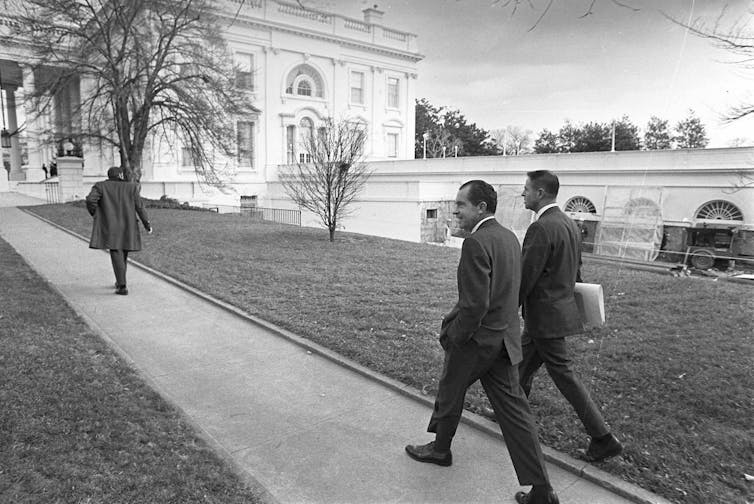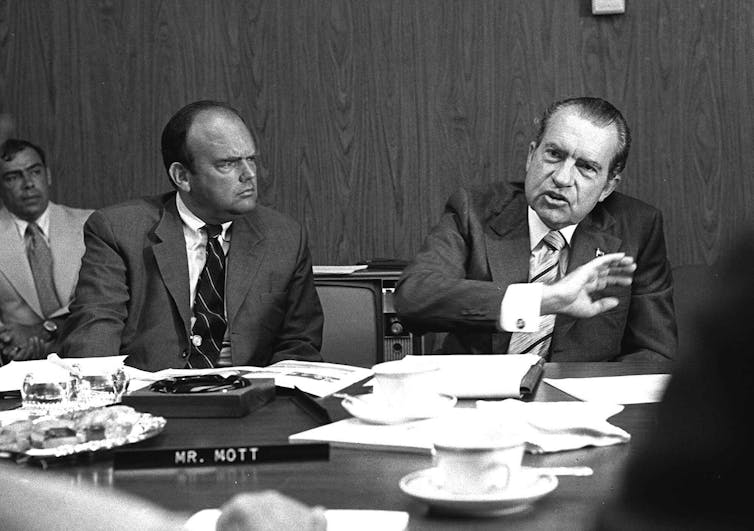
Experts in autocracies have pointed out that it is, unfortunately, easy to slip into normalizing the tyrant, hence it is important to hang on to outrage. These incidents which seem to call for the efforts of the Greek Furies (Erinyes) to come and deal with them will, I hope, help with that. As a reminder, though no one really knows how many there were supposed to be, the three names we have are Alecto, Megaera, and Tisiphone. These roughly translate as “unceasing,” “grudging,” and “vengeful destruction.”
“Protecting the Institution of the Presidency,” in and of itself,is not a bad idea. The bad ideas come in when it becomes confused with “protecting the President at all costs,” which is NOT the same thing by any means. I don’t expect to need to explain that to anyone here, but it apparently does need to be explained to a lot of people who really should know better. And way too many of those people are in Congress and sprinkled throughout the courts. Hopefully a look at what the founding fathers ctually thought – as evidenced by what they actually said (and did) could help to clear this up a bit.
==============================================================
Trump’s indictment is unprecedented, but it would not have surprised the Founding Fathers
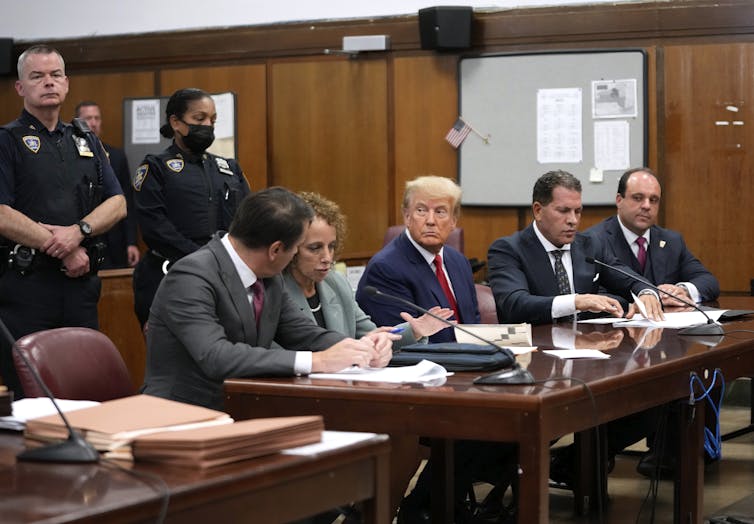
Pool/ Getty Images News via Getty Images North America
Much has been made of the unprecedented nature of the April 4, 2023 arraignment on criminal charges of former President Donald Trump following an indictment brought by Manhattan District Attorney Alvin Bragg. But a closer look at American history shows that the indictment of a former president was not unforeseen.
What the Constitution says about prosecuting a president
The Constitution’s authors contemplated the arrest of a current or former president. At several points since the nation’s founding, our leaders have been called before the bar of justice.
Article 1, Section 3, of the Constitution says that when a federal government official is impeached and removed from office, they “shall nevertheless be liable and subject to Indictment, Trial, Judgment and Punishment, according to Law.”
In his defense of this constitutional provision, Founding Father Alexander Hamilton noted that, unlike the British king, for whom “there is no constitutional tribunal to which he is amenable; no punishment to which he can be subjected,” a president once removed from office would “be liable to prosecution and punishment in the ordinary course of law.” Trump has been impeached twice, but not removed from office.
As a scholar with expertise in legal history and criminal law, I believe the punishment our Founding Fathers envisioned for high officeholders removed from office would also apply to those who left office in other ways.
Tench Coxe, a delegate from Pennsylvania to the Continental Congress from 1788–89, echoed Hamilton. He explained that while the Constitution’s speech and debate clause permanently immunized members of Congress from liability for anything they might do or say as part of their official duties, the president “is not so much protected as that of a member of the House of Representatives; for he may be proceeded against like any other man in the ordinary course of law.”
In Coxe’s view, even a sitting president could be arrested, tried and punished for violating the law. And, though Coxe didn’t say it explicitly, I’d argue that it follows that if a president can be charged with a crime while in office, once out of office, he could be held responsible like anyone else.
The indictment of Aaron Burr
Hamilton’s and Coxe’s positions were put to an early test soon after the Constitution was ratified. The test came when jurors in New Jersey indicted Vice President Aaron Burr for killing Hamilton in a duel in that state.
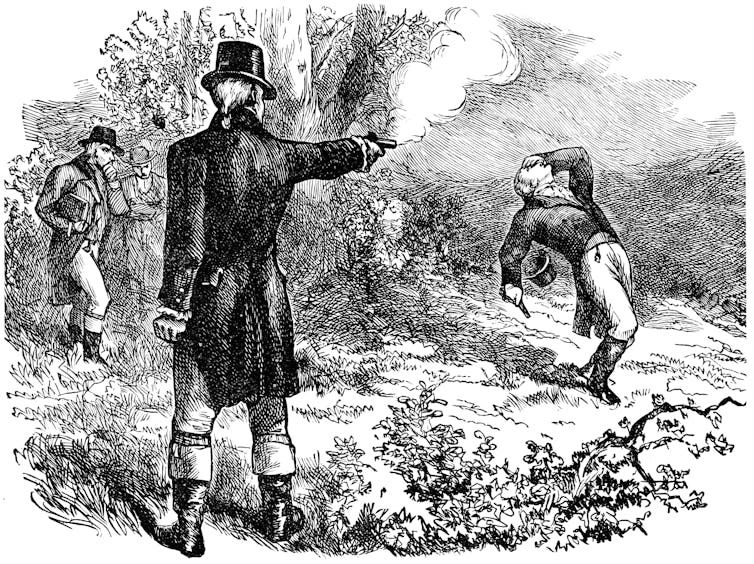
Ivan-96/DigitalVision Vectors via Getty Images
The indictment charged that “Aaron Burr late of the Township of Bergen in the County of Bergen esquire not having the fear of God before his eyes but being moved and seduced by the instigation of the Devil … feloniously willfully and of his malice aforethought did make an assault upon Alexander Hamilton … [who] of the said Mortal wounds died.”
While Burr’s powerful friends subsequently interceded and persuaded state officials to drop the charges, their success had nothing to do with any immunity that Burr enjoyed as an executive officer of the United States.
Indeed, Burr’s legal troubles were not over. In February 1807, after his term as vice president ended, he was arrested and charged with treason for plotting to create a new and independent nation separate from the U.S. This time, he stood trial and was acquitted.
The Strange case of Ulysses S. Grant
Fast forward to 1872, when the incumbent president, Ulysses S. Grant, was arrested in Washington, D.C., for speeding in his horse-drawn carriage.
The arresting officer told Grant, “I am very sorry, Mr. President, to have to do it, for you are the chief of the nation, and I am nothing but a policeman, but duty is duty, sir, and I will have to place you under arrest.”
As The New York Post recently recounted the story, Grant “was ordered to put up 20 bucks as collateral.” But he never stood trial.
20th and 21st century precedents
A little over a century later, Republican Vice President Spiro Agnew had a more serious brush with the law when he was accused by the Department of Justice of a pattern of political corruption starting when he was a county executive in Maryland and continuing through his tenure as vice president.
On Oct. 10, 1973, Agnew agreed to a plea bargain. He resigned his office and pleaded no contest to a charge of federal income tax evasion in exchange for the federal government dropping charges of political corruption. He was fined US$10,000 and sentenced to three years’ probation.
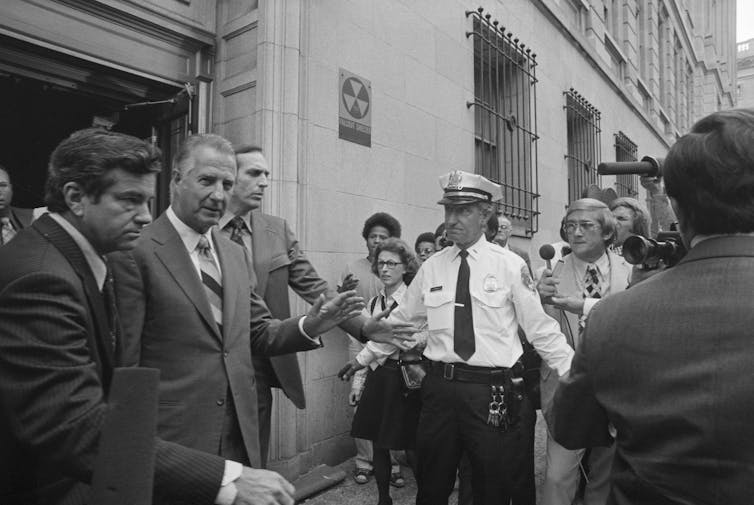
Bettmann via Getty Images
Richard Nixon, the president with whom Agnew served, narrowly escaped being indicted for his role in the Watergate burglary and its cover-up. In 2018, the National Archives released documents, labeled the Watergate Road Map, that showed just how close Nixon had come to being charged.
The documents reveal that “a grand jury planned to charge Nixon with bribery, conspiracy, obstruction of justice and obstruction of a criminal investigation.” But an indictment was never handed down because, by that time, Hamilton’s and Coxe’s views had been displaced by a belief that a sitting president should not be indicted.
Nixon was later saved from criminal charges after he left office when his successor, President Gerald Ford, granted him a full and complete pardon.
Another occasion on which a president came close to being charged with a crime
occurred in January 2001, when, as an article in The Atlantic notes, independent prosecutor Robert Ray considered indicting former President Bill Clinton for lying under oath about his affair with former White House intern Monica Lewinsky.
Ultimately, Ray decided that if Clinton publicly admitted to “having been misleading and evasive under oath … he didn’t need to see him indicted.”
And in February 2021, after President Trump had left office, Republican Senate Minority Leader Mitch McConnell acknowledged that the former president, who had escaped being removed from office twice after being impeached, would still be legally “liable for everything he did while he was in office … We have a criminal justice system in this country. We have civil litigation. And former presidents are not immune from being held accountable by either one.”
What history teaches about Trump’s indictment
This brings us to the present moment.
For any prosecutor, including Alvin Bragg, the indictment and arrest of a former president is a genuinely momentous act. As Henry Ruth, one of the prosecutors who was involved in the Nixon case, explained in 1974, “Signing one’s name to the indictment of an ex-president is an act that one wishes devolved upon another but one’s self. This is true even where such an act, in institutional and justice terms, appears absolutely necessary.”
For the rest of us, this nation’s history is a reminder that ours is not the first generation of Americans who have been called to deal with alleged wrongdoing by our leaders and former leaders.![]()
Austin Sarat, William Nelson Cromwell Professor of Jurisprudence and Political Science, Amherst College
This article is republished from The Conversation under a Creative Commons license. Read the original article.
==============================================================
Alecto, Megaera, and Tisiphone, I would have liked to read something about, say, Jackson, and Harding – but since neither faced any prosecution, their stories would really not add to this article, which is about actual and potential precedent. The point is, anyone who actually cared about what the founding fathers (would have) wanted would take steps to ascertain what that acually was, would they not? Republicans today are making it pretty obvious that they don’t care.
The Furies and I will be back.











